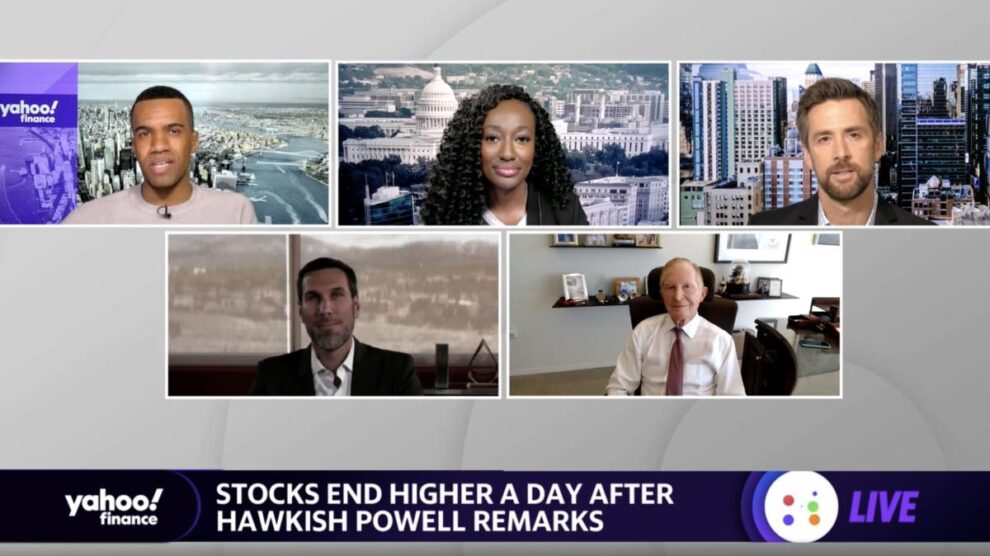
Sanders Morris Harris Chairman George Ball and Jeff Klingelhofer, Thornburg Investment Management Co-head of Investments, join Yahoo Finance Live to discuss the Fed, market outlook, inflation and oil prices compounding Fed tightening, President Biden’s sanctions on Russia, and FAANG stocks.
Video Transcript
[BELL RINGING]
[CHEERING]
BRAD SMITH: And that’s the closing bell on Wall Street. We’re taking a look at the major averages as well in the bottom corner of your screen, and now full screen here– full size imagery for you there. The Dow Jones Industrial average, you’ve got that closing higher by about 7/10 of a percent on the day– 250-ish points to the upside there.
The S&P 500 also saw gains on the day of more than 1.1%, just 50 points higher for the S&P 500. And then additionally, you saw the NASDAQ composite, the tech-heavy average, there on your screen right now, close at 14,108– that’s the level that we see here at the close– 270 points higher for the tech-heavy NASDAQ– nearly 2% higher on the day, we should say.
All right, getting into our panel discussion here, we’ve got two special guests that are going to be joining with us to discuss what’s taking place during today’s tape. We’ve got Jeff Klingelhofer, who is the Thornburg Investment Management Co-Head of Investments. We’ve also got George Ball, who is the Sanders Morris Harris Chair. Great to have both of you here with us today.
Jeff, I want to start things out with you. You say this is still a Fed game. What are your anticipations for what we may see at the next Fed meeting with that in mind, and even the commentary from Fed Chair Jerome Powell that certainly took the markets yesterday?
JEFF KLINGELHOFER: Absolutely. I mean, yesterday was a shocking day to me– just the rhetoric shift. We have to remind ourselves that every word within the prepared remarks is highly intentional. And some of those shifts were pretty dramatic, both to myself, and I think to the market. You know, my belief going in prior to yesterday had been that the Federal Reserve truly in their heart of hearts believes that inflation is transitory in nature and we will see it come down over the summer.
I still believe that. But I will say my confidence is shaken. And I think what we saw from Jerome Powell yesterday is that his confidence is shaken. And so, really, we’ll be watching the inflation reports incredibly carefully. But to directly answer your question, if we have another high inflation print, I think the market will have to start pricing in the potential for 50 basis point rate hikes, even the potential for an intermediate hike, and a Fed that is truly scared of inflation being out of control.
– And, George, do you agree in terms of how aggressive we might see the Fed become and what, perhaps, the yield curve is telling us about how soon we might see a recession start to kick in to the real economy?
GEORGE BALL: The flattening of the yield curve is scaring the bejesus out of most investors and traders. I think that the markets have priced in inflation at 8%, 6% by midyear, 4% by the end of the year. And whatever the Fed does that will help to meet that glide path is not going to upset the market one way or the other.
Clearly, the once Yellen put now Powell put is gone. But, as Jeff says, the markets expect inflation to subside– perhaps not to be transitory, but to subside. The big factor moving the markets day-to-day, although we may not like to say it, is whether the risk of nuclear weaponry in the Ukraine is more acute or less acute.
That’s really the traders’ key in the here and now. And I think it’s the reason why the markets have been somewhat stronger– or quite strong these last two days.
– And, Jeff, how do you think the Russian invasion of Ukraine is impacting the markets and the likelihood, following up on George’s comment there, about the likelihood of a recession next year?
JEFF KLINGELHOFER: You know, my belief is still that the US consumer, in particular, is incredibly strong. Unlike much of the rest of the world, the US is actually relatively insulated from what’s going on between Russia and Ukraine, and the bleedover of natural gas prices that naturally hits parts of Europe in a very acute way. The place where we’re not insulated, of course, is the significant rise in oil prices.
And you combine the significant rise with oil prices with the significant rise in underlying mortgage rates, and even before the very first Fed hike, there’s already been roughly a year of tightening that’s been hitting the consumer. And it’s only tightening at a faster and faster pace. And so all of this should bleed through, in my opinion, to a likely slowdown in consumption, an eventual gradual decrease of underlying inflation, probably continued inflationary dynamics from wage pressures.
But I think the Fed will call that good inflation. That’s the inflation they want to engineer. And so long as inflation does fall down to that 3%-ish level, then I think the US can actually avoid a recession. But that range of outcomes is narrowing. And that should be spooking markets more than it is today.
BRAD SMITH: George, President Biden is heading over to Brussels, Belgium. And he’s going to be meeting with some NATO leaders as well. And the discussion is not just about sanctions that have already been imposed on Russia amid the invasion of Ukraine. It’s also going to be about what additional steps need to be taken, how closely will markets be watching that, and then, additionally, you know, how can world leaders ensure that their own economies don’t have to endure additional detriment as a result of some of the sanctions that they may look to levy even on top of those already in place?
GEORGE BALL: To the extent that the free world leaders, broadly defined, can agree on yet greater sanctions, particularly ones that will handicap further Russia’s access to the money markets, or the cash, or the deposits, or assets that they may have– that will be viewed, I think, as a strong step– short of military, but very strong, by the markets.
I think that there is a dichotomy, though, between the need that each of the country leaders have for their own domestic economies and what may be good for the global economy. Here in the US, for example, the Biden administration is very conscious, as is the Fed, that things that appear to propel the stock market up but that may end up hurting the consumer are not going to be politically popular and may not be economically wise.
There has even been talk, I’m told, about raising margin requirements for the first time in 25 years or so. That would be a very unprecedented move. I think it would be very negative for the stock market, whether it was wise or not. But, clearly, the leaders are looking for unconventional and novel ways to curb, and hinder, and hurt, and squeeze Russia on the one hand, but not to disrupt their domestic or the international economies to the extent possible.
– So, Jeff, against this sort of backdrop, then, in your note, you talked about the algebra of success being made up of portfolio balance. With that in mind, how do you position your portfolio right now? What looks most attractive to you?
JEFF KLINGELHOFER: Yeah, as I mentioned earlier, I think the US consumer remains one of the bright spot of the global economies. We continue to see wages rise. We continue to see confidence, at minimum, hold in there. And just prior to this segment, the talk about tipping– just the willingness to go out, to interact, to engage with the outside world, which we’ve been repressed from for the past couple of years.
So anything tied back to the consumer we believe remains very, very strong, despite that tax of rising oil prices, higher gas prices, and higher mortgage rates. But on top of that, within fixed income portfolios, which I manage in particular, and more broadly trying to provide good and consistent outcomes to clients. It’s important to remember that those range of outcomes, and while we all thought we could become COVID experts we’re all shifting to becoming Russia-Ukraine experts, and we have to remind ourselves that the range of outcomes is actually quite wide, but the range of good outcomes is narrowing by the moment.
And so with that in mind, the backdrop for us is one of playing more defense than offense and being very choosy where we do choose to move into those offensive roles. We are seeing some pockets in securitized products, in particular, really, that we do find attractive.
– Jeff, the S-word stunned me in your notes– and that S-word, shun, not the other one. Shun FAANG stocks. They’re all having a pretty good day as the NASDAQ is up 270 points. Why do you believe they are a bad buy?
JEFF KLINGELHOFER: Well, it’s amazing to see today, right, that the question of why have these stocks done so well. There’s been a lot of explanations from the work from home transition. And as we migrate from work from home to back to interacting with the world, that should be a headwind. The second part, of course, is in a world of low rates, you discount those forward cash flows of very, very growthy stocks at a lower discount rate. And that is also unwinding.
So the challenge of very high multiple companies, despite the fact the reality, they are very high quality companies as well. But the starting backdrop with the significant run-up that we had seen leaves me concerned. And so that would explain the S-word of shun the FAANG stocks broadly.
– Well, I want to thank our market panel for joining us today– Jeff Klingelhofer, Thornburg Investment Management’s Co-Head of Investments, and George Ball, Sanders Morris Harris Chairman. Thank you both so much.







